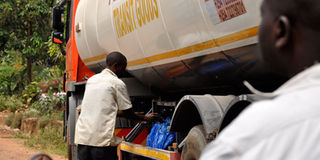Government to suspend fuel companies dealing with unlicensed retailers

Fuel adulteration, according to UNBS is mostly done by transporters. PHOTO BY EDGAR R BATTE
What you need to know:
- Done outside Uganda: According to Mr Kitimbo, UNBS has tried to increase compliance in regard to the entry of adulterated fuel.
- Mr Peter Kitimbo, the principal analyst as Uganda National Bureau of Standards, said a number of stations continue to adulterate fuel even as there has been a reduction.
Kampala. Ministry of Energy has warned oil marketing companies to stop selling fuel to unlicensed dealers or risk penalties.
Speaking at a stakeholders fuel marking programme in Kampala yesterday, Rev Justaf Frank Tukwasibwe, the commissioner of petroleum supply at the Ministry of Energy, said fuel wholesalers are sleeping on duty of verification and “disorganising free and fair competition” by dealing with unlicensed retailers.
“If you continue selling to any person [or company] that is not licensed and there is proof that you sold to that person, we shall have no option but to invoke the relevant sections of the law which include suspension or outright revocation of the license,” he said, noting that a number of [filling] stations that actually adulterate fuel are stations that have not been licensed.
The Petroleum Supply Act prohibits anyone from dealing in petroleum supply without a licence.
Uganda has 2,464 fuel retailers. However, Rev Tukwasibwe noted that compliance of fuel marking had improved reducing to 0.6 per cent as of April 2018.
Mr Yasin Nasser, the Moil country manager, welcomed the ministry’s decision but expressed concern over the difficulty to differentiate between a genuine and unlicensed dealers.
“You cannot know who is licensed or not. There is no particular means to verify who is licensed and who is not,” he said on the sidelines of the workshop.
“The system is that if you are putting up a fuel station, you need to have necessary approvals. By the time you come to me, I believe you have the necessary approvals. If a company has a licence from URA showing it is VAT registered, I cannot be able to know if it is licensed or not because it is not cheap to put up a petrol station,” he added.
Mr Peter Kitimbo, the principal analyst as Uganda National Bureau of Standards, said a number of stations continue to adulterate fuel even as there has been a reduction.
Adulterated fuel is a mixture of kerosene and petrol or diesel, which is usually cheaper compared to genuine fuel.
Mr Kitimbo said the adulteration is mostly done by transporters between the loading terminals and at border posts. In some instances, he revealed, it is done within the country at depots and retailing stations.
Compliance
Done outside Uganda: According to Mr Kitimbo, UNBS has tried to increase compliance in regard to the entry of adulterated fuel. However, they have found out that fuel adulteration is now done in Kenya as it has become increasingly hard to do it here.
UNBS has set up laboratories to test adulterated fuel at border posts such as Malaba and has urged oil marketing companies to eliminate transporters who are distorting the market.




